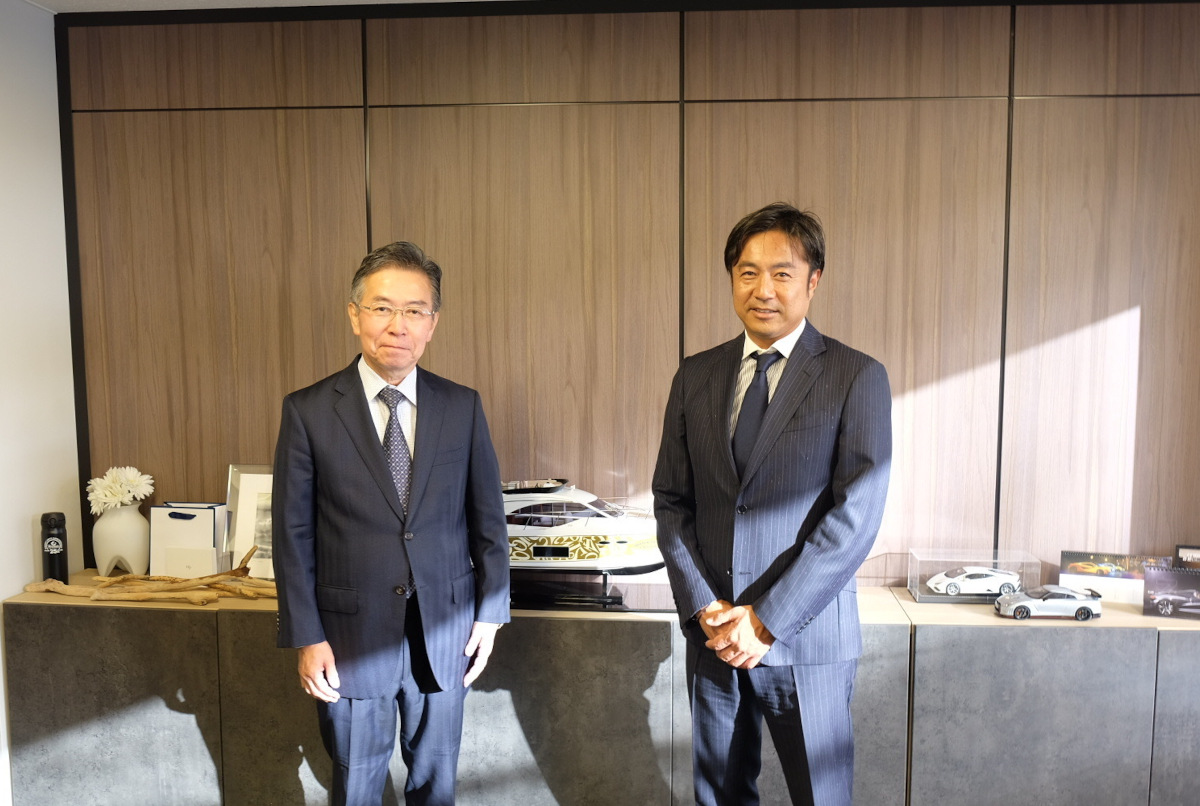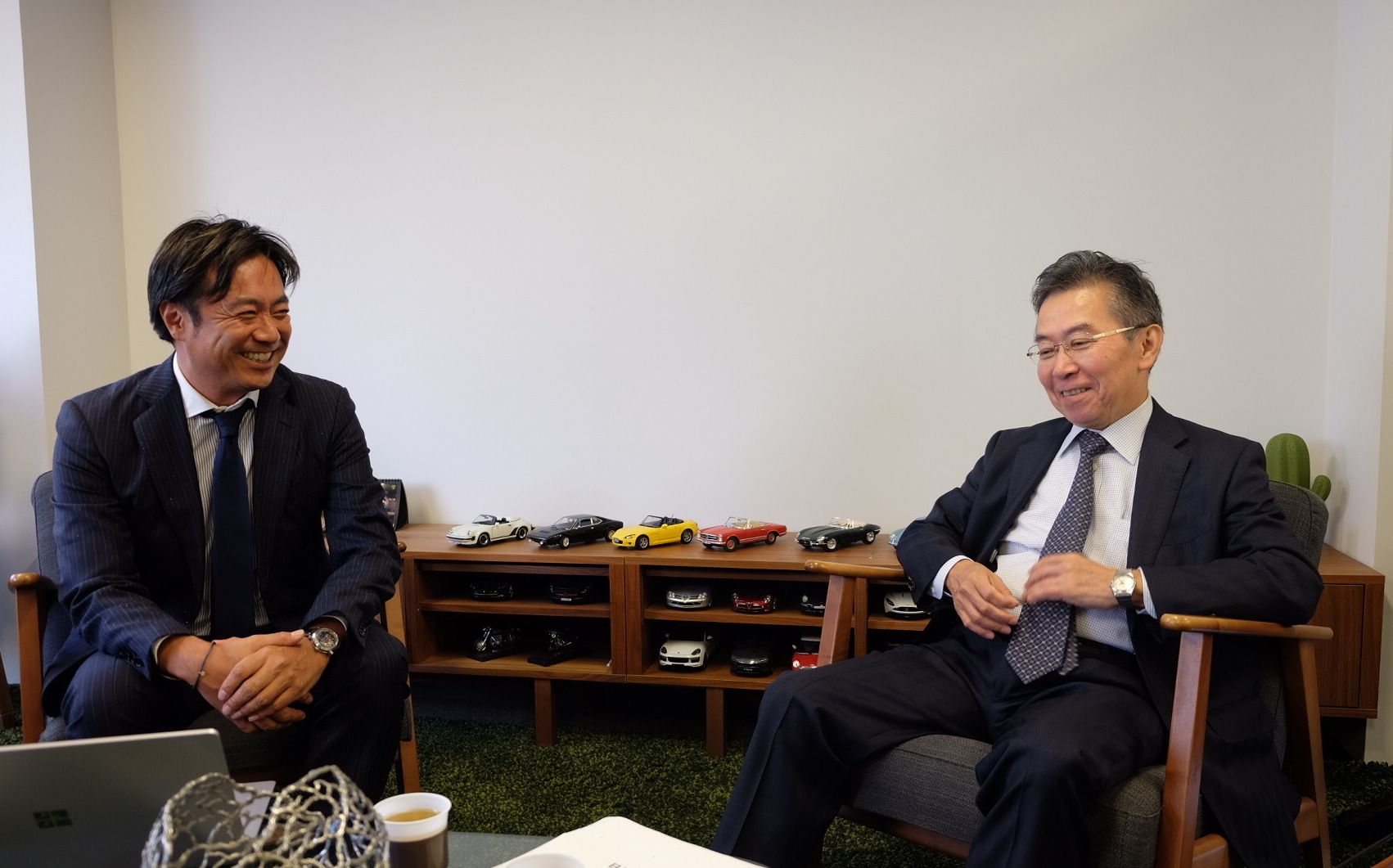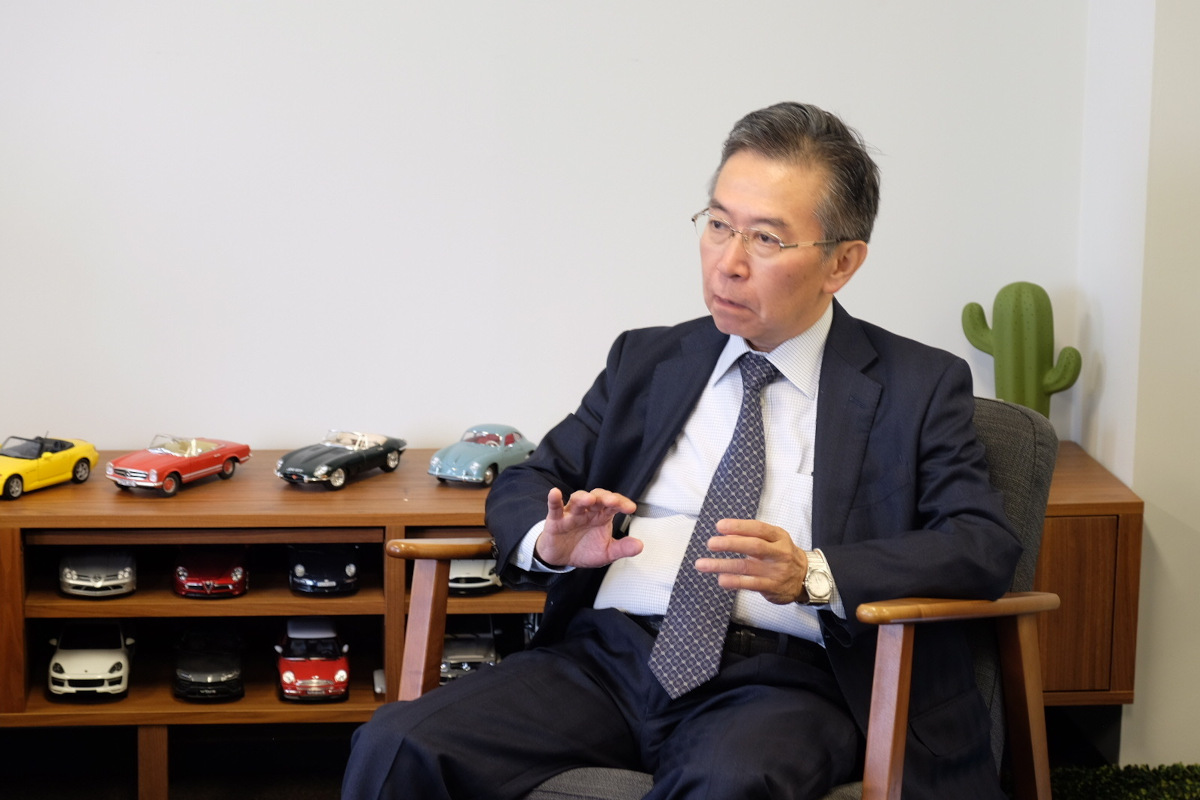
2023.12.01
Former Director General of the Japan Tourism Agency, Hiroshi Tabata × CEO of Gift Life, Marehiko Yamada Special talk
The way to Japan as a Tourism Nation: The Power of Innovation
How they met
Tabata:At first, we were introduced by a mutual acquaintance. When I heard about A wonderful day (AWD) from Yamada-san, I thought, "That's interesting! I told him that I had found a good point for a so-called high-value-added business service targeting the ultra-wealthy, which is already a core strategy for Japan as a tourism nation.
From this luxury market, we will first come back towards the after COVID-19. We are going to focus on this market in each country. Another thing is that although I have already retired, the Japan Tourism Agency is actively working with the private sector and local governments to support this effort, including financial support, so I advised him that you should learn more about it. And also I thought I could give you some advice if something happen. That was the beginning.
Yamada:After receiving Mr. Tabata's words, I realized that I am not mistaken in what I am seeing. I also grew up in Japan and would like to spread the beauty of Japan to the world.
I am grateful to Japan, and I wonder what I can do to contribute to it. I am now turning 50 years old, and I realized that it is very important that the direction of the country and my own direction match in terms of how I can contribute to the country while I continue to grow. When I received such words from someone like Mr. Tabata, I really felt like I received a big push. Since then, I have been contacting you on a one-way basis on a regular basis. I am very grateful to him.
Current Activity
Tabata:Actually, I had been working with such a feeling when I was in my current position, and I thought that it was very important to match the government and local government offices with the private industry. Even after I left my position, I have been trying to connect various companies, especially venture companies, who are working on various new projects, as their names are not well known, unlike large companies.
The government side also does not have a chance to get to know each other since they are not usually involved in industrial activities, so I think it is very necessary to talk with various ventures and make the most of their opportunities.
About GiftLife's new business = AWD
Yamada:We are in the bridal related business, and one of the major trends over the past few years has been an increase in the number of people who get married but do not hold weddings. On the other hand, the number of people who do not have weddings but just take pictures to commemorate their marriage, called "photo weddings," is increasing. We are happy to rent special mobility vehicles for photo shoots, since it is a finest moments.
I myself love mobility, not just as a means of transportation, but as a means of preserving the automobiles that have supported the development of mankind and Japan's economy in the 20th century, and to preserve their charm for the future generations. As a finest moments of their life, I want to preserve the charm of this car for their memories and for their future children. That was the idea behind this project. I see cars not simply as mobility, but as art.
Then, a friend of mine happened to introduce me to a car-sharing company for foreign tourists, and I rented out a car as a trial run. The timing was right in the middle of the COVID-19 period, so we didn't receive many inquiries at the time, but this spring we started to receive a increase in inquiries. I wondered what kind of people were actually renting these cars. So I went to see the rental cars myself a few times. I found out that people who want to rent a Ferrari, Lamborghini, or GTR have a story behind it.
For example, the customer's son loves Lamborghini, and when they were coming to Japan for a tennis match, they asked us to borrow a Lamborghini. When we went to bring the Lamborghini, the father came out and said, "Actually, this is a surprise for my son, and he ask us to hide where his son can't see the Lamborghini and come in when I give the signal.At first I was doing it for the purpose of filming for a play, but if they were so pleased with it, I thought it has a great potential. In addition, when actually talking with hotel concierges, many guests who are based in Tokyo also wish to go sightseeing within 1 to 3 hours from Tokyo. But transportation is still a major issue.If that case, could it also contribute to the transportation issues that Japan is currently facing for wealthy foreigners? I thought.Then we can not only use it as a means of transportation, but also connect countryside and Tokyo as a mobility experience, and turn the time spend traveling into a richer time. It can also contribute to the revitalization of countryside. Yes,I think this will make everyone happy.
Also, as we discovered while doing this, many people who own supercars, classic cars, and other such vehicles have multiple cars.In the case of pleasure boats and helicopters, there are few people who own more than one, but even so, in Japan, there are inevitably four seasons, and the best season exists or is limited to weekend use.The point is that is a very large amount of time that it is not in operation.As an asset of idle assets, wealthy foreign visitors to Japan can create various demands regardless of the season or weekend, for example, driving a convertible car even in winter, sightseeing by boat in Tokyo Bay, or viewing Mt. Fuji from the Pacific Ocean. We believe that new social phenomenon of sharing can also contribute to the utilization of idle assets.
Impressions on AWD
Tabata:People who like cars want to have a special experience. In that sense, I think this is a very valuable way to come to Japan and experience the good things about Japan, and it is a very innovative initiative to turn transportation into an enriching experience.
Also, I think it is a very good idea to utilize idle assets such as luxury cruisers, super yachts, helicopters, private jets, etc., and to rent them out to wealthy foreigners.Now, offices and vacation homes are being actively shared, but only when you use them and the rest of the time they are rented out on a shared basis.That is really healthy idea.I think that AWD is a very good idea because it is attractive and communicative in the opposite direction, such as sharing luxury transportation vehicles or cruisers.

Current Challenges for Japan in Becoming a Tourism Nation
Tabata:The Tourism Nation Administration was launched under the name of the Visit Japan Campaign when Prime Minister Koizumi was Prime Minister, and it was actually the first time that the tourism industry was given a general budget for promotion.Originally, in Japan, as I have always said, tourism is traveling on their own time, but then the atmosphere becomes awkward, for example, "It's nice to take a week off."
People in Europe, especially in Germany, work a whole year in order to take two weeks off in the summer time, which is the opposite order.It has taken hold among Europeans.However, In Mr. Koizumi and Abe administration, Chief Cabinet Secretary Kan from the Prime Minister. wanted to make Japan a tourism-oriented country, and they wanted us to do it properly. Since tourism is an industry that extends to all areas, the entire government, including all ministries, has been working hard to develop it.
The current challenges are that Japan has finally come to be known as a tourism-oriented country.In terms of inbound, I think it has become more comfortable for various people to come to Japan. And Japan has a long history, culture, and rich in nature, and also food is highly regarded around the world. Surprisingly, the Japanese do not evaluate its value very much. I am proud of it.
I think we need to take a step further in reaffirming our pride as Japanese people and our region, and then convey that pride to foreign visitors.And one more point. The whole inbound thing.I think we need to take a step further in reaffirming our pride as Japanese people and our region, and then convey that pride to foreign visitors.If we can get a decent price here, the industry will attract more people who can work with proper and good treatment and improve the quality of service, which will lead to a good cycle of higher appreciation and profitable business.
This is a turning point for us, and I think one of the major issues is how to deal with this.Therefore, I think it is very timely that we need to transmit information on how luxury goods are being evaluated by people overseas.
Yamada:As you say, Japan is a country where manufacturing is the starting point, so it is probably not very good at promoting added value in the service industry.Ventures and the like, especially when I go to Japanese‐style hotel, I wonder why the prices are so low.However, I think it is a real loss for Japan if long-established Japanese hotel with a long history are disappearing due to a shortage of labor or succession problems. That is why we should have more confidence in our level of service.
The price issue is because the price has been this price until now after all. If we raise the price, the customers who have been coming to us until now will leave us. So, instead of raising the price, we should look at the overall situation a little more and make further updates. Since foreign hotels do this by controlling their prices through a variable price system, I think Japanese hotels should also be able to respond flexibly to this situation.Waiting. But it doesn't move that much on weekdays. Even if you want to move that boat for sightseeing, there are several major hurdles in getting a permit for the pier and operating it as a tramp service business. Also, there are many tower condominiums along the Tokyo coast, and they face the canal and the ocean, so I think it would enrich people's lives if people who live in condominiums in that area could bring their friends and parents and enjoy boating and sailing together there.
There are many ideas, but there are regulations that are difficult to overcome. For example, the Seamen's Law, which was enacted in the 1940s, is still in force. Therefore, I have already begun to feel that it is necessary for the public and private sectors to work together to solve some of these problems.
Tabata:There are many areas where regulations and rules are slightly obstructive. In fact, ever since current position in government, my lifestyle has been to say, "Why don't you change what you think is strange? If we are too slow, we will be left behind. We are not a country that can afford it, so we are getting poorer and poorer.This has been my theory since I was in my current position, so after I left, I would say more vehemently than anything else and give concrete examples to open the way for people to give it a try first, and if it goes well, then expand horizontally. and also we can expand horizontally. I think it is a good idea to do so. I think it would be best to create such examples.
But unfortunately, we have become a country that really hates to change the rules and change new things. I think it's not good. We cannot keep up with the world if we don't change our ways, I think.
Potential for Innovation in a Tourism Nation
Tabata:Japanese people are naturally capable of innovation, and they can do it, but when they do something, sometimes it doesn't go well.When you try to promote some new innovation, what do you do when something goes wrong and you have a problem? Some people say "Can you take responsibility if something goes wrong?" If something goes wrong after you try it, you can just stop it or fix it. If you don't do something like that, I think that's very conservative.
Also, in the case of Japan, the most important thing that we are focusing on now in the tourism administration is how to attract visitors to the regions and how to increase the number of people staying in the regions.For the countryside, there are more and more bad stories: the birthrate is declining, the population is aging, more and more people are disappearing, there is no industry, and there is no place to work.Tourism and primary industries such as agriculture, forestry, and fisheries can also be utilized to a great extent. Foreigners evaluate these industries highly. Even if they spend a few nights in Tokyo, what they originally want to do is to visit the regions. Therefore, how to attract tourists to the regions and increase the number of stays is a major goal of tourism administration and the trump card for regional development. This is what we are focusing on.
Expectations for AWD
Tabata:As I mentioned in my comments at the time of release, I think they really want to move around comfortably and stress-free.Now, due to the shortage of labor, there are not enough cabs, and there are long waiting times at train stations and airports. If we can make it comfortable, the traveler will feel more comfortable and satisfied with a smooth trip to the destination.
I would be very happy if we could get more and more people from overseas to tell us that this is a good idea, which would lead to the loosening of the various rules I mentioned earlier, which would ultimately be beneficial to Japan.

Mr. Hiroshi Tabata's Profile:
1981: Graduated from the University of Tokyo's Faculty of Law, joined the former Ministry of Transport.
2002: Chief of the Tourism Promotion Division, General Policy Bureau, Ministry of Land, Infrastructure, Transport and Tourism.
2009: Director of the Tourism Regional Promotion Division, Japan Tourism Agency.
2015: Chief of the Minister's Secretariat, Ministry of Land, Infrastructure, Transport and Tourism.
2016: Councillor, Ministry of Land, Infrastructure, Transport and Tourism.
Hiroshi Tabata is from Aichi Prefecture.
